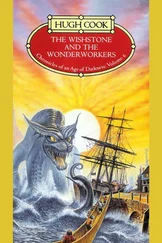Hugh Cook - The Wazir and the Witch
Здесь есть возможность читать онлайн «Hugh Cook - The Wazir and the Witch» весь текст электронной книги совершенно бесплатно (целиком полную версию без сокращений). В некоторых случаях можно слушать аудио, скачать через торрент в формате fb2 и присутствует краткое содержание. Жанр: Фэнтези, на английском языке. Описание произведения, (предисловие) а так же отзывы посетителей доступны на портале библиотеки ЛибКат.
- Название:The Wazir and the Witch
- Автор:
- Жанр:
- Год:неизвестен
- ISBN:нет данных
- Рейтинг книги:5 / 5. Голосов: 1
-
Избранное:Добавить в избранное
- Отзывы:
-
Ваша оценка:
- 100
- 1
- 2
- 3
- 4
- 5
The Wazir and the Witch: краткое содержание, описание и аннотация
Предлагаем к чтению аннотацию, описание, краткое содержание или предисловие (зависит от того, что написал сам автор книги «The Wazir and the Witch»). Если вы не нашли необходимую информацию о книге — напишите в комментариях, мы постараемся отыскать её.
The Wazir and the Witch — читать онлайн бесплатно полную книгу (весь текст) целиком
Ниже представлен текст книги, разбитый по страницам. Система сохранения места последней прочитанной страницы, позволяет с удобством читать онлайн бесплатно книгу «The Wazir and the Witch», без необходимости каждый раз заново искать на чём Вы остановились. Поставьте закладку, и сможете в любой момент перейти на страницу, на которой закончили чтение.
Интервал:
Закладка:
‘Discipline is good,’ says your average citizen; meaning, in truth, ‘I love power, and cannot find it on my own, for on my own I am as nothing.’
‘The gods are great,’ he says; meaning, ‘the gods reward my worship by allotting to me the worship of my wife, a worship made a very law of piety.’
‘If you would have peace then prepare for war,’ he says; meaning, ‘the militarization of the state in peace as well as war is the best enforcement of that hierarchy of discipline which rewards obedience with power.’
All this is true; yet unacknowledged. For it is a characteristic of humankind that the most bitter realities of their lives — the inevitability of death and the fatuosity of the periodic slaughters which so accelerate that death — are rarely conceded except by a small fraction of aberrant intellects most likely persecuted for such acknowledgement.
Thus, as ants in their mindless millions go to war, so go men; and, while philosophers of biology declare the intellect of the average human to be greater than the corresponding resource of the ant, the differences in the ultimate outcome of their behaviour are so slight as to be unobservable.
Such subordinations are alien to the intellects of wizard and poet alike; for, being possessed of powers won in solitary endeavour outside the antheap, they are disinclined to submit to those oppressions which the common citizen clamours to embrace.
It follows from above that the most unkempt band of syphilitic bandits is apt to display more political cohesion than the inhabitants of a salon of imperial poets; and the most murderous brood of pirates, though its members be universally refugees from the law of ordered States, enforces among its own number a discipline of war which wizards of Argan’s Confederation could only look upon in outright envy; and warriors, who in their leisure time display a gross indiscipline of drink and lust, conform upon the battlefield in perfect regulation.
In summary:
As it is with the warrior, so it is with your common citizen. Unlike wizard or poet, your common citizen holds no power in his own right, and can win power only by joining an antheap of oppressions. He joins the State because the State is in many ways a conspiracy to give him power. Power over property; power over slaves; power over the women in his life; power over children and his economic inferiors.
Thus so many applaud the State when the State is savage, and wrathful, and cruel; and thus a leader who kills, maims, tortures, imprisons and oppresses is often widely applauded as long as he is adroitly selective in his choice of victims. The poverty and suffering of the weak delight the strong, for thus they see their own power enhanced.
He crushed: he was a great leader.
He killed: he was a great leader.
He destroyed: he was a great leader.
He oppressed: he was a great leader.
He warred: he was a great leader.
Great, yes, and very holy.
It happens that from time to time a ruler of a different sort arises.
Justina was such a ruler.
The Empress Justina believed no self-justifying rhetoric of power, least of all that rhetoric which claims the might of the State to be a good in its own right. Instead, she perceived the State through the eyes of common sense. She saw that humans living as thickly upon the ground as they do within the confines of Injiltaprajura must combine to manage the supply of their water and the disposal of their sewage; that a regulated coinage and a disciplined merchantry can enhance the collective prosperity; that the collective State can extend to the aged and the indigent great mercies of charity which would be beyond the patience or the means of the individual; and that a just system of law supplies the aggrieved with an orderly remedy of wrongs so great that they would otherwise threaten the common peace.
The Empress Justina was good; and merciful; and wise; and therefore out of favour with most of her citizens. For an imperial disinclination to make the State an instrument of selective oppression thwarts the desires of those many citizens who wish to be lords of wrath in their own households and the neighbourhood streets.
Why then had she remained in power for so long?
On Untunchilamon, the Family Thrug came to power at the beginning of Talonsklavara. Lonstantine Thrug seized his opportunity and overthrew Wazir Sin in a move which owed everything to bloody ferocity and political opportunism; and such were the initial uncertainties of civil war that none wished to be the first to oppose him. For any wazir of Untunchilamon must necessarily support one side or another in Talonsklavara or else incur the wrath of both — and who could say which side would triumph?
When Lonstantine was incarcerated in the Dromdanjerie as a consequence of his mounting insanity, his daughter Justina inherited his throne and the very uncertainties which supported it. Later, when the victory of Aldarch Three became a probability, her position weakened, to the point where Aquitaine Varazchavardan had dared to coup against her.
Thereafter she had stayed alive (and in power) by bluff, luck, the loyalty of friends, and her own audacious skills at political manoeuvring.
But, now that Aldarch Three was known to have triumphed in Yestron (Manthandros Trasilika had been a fraud, and his priest Jean Froissart no better, but interrogation of sailors from the Oktobdoj had proved much of their news to be true), there was no rational basis for believing that Justina’s power would continue much longer.
While Master Ek belonged to that multitude which actually believed the Crab to be temporarily ruling Injiltaprajura (with Chegory Guy and Olivia Qasaba as secretary-couriers), Ek nevertheless saw that as a temporary aberration, and quite reasonably believed (on the basis of the patterns of centuries of recorded history) that the Crab would shortly lose interest in political endeavour.
Ek therefore had no long-term worries about the Crab, though he believed that dignitary must be treated with the greatest caution in the short term. Rather, he saw his true enemy as being Justina Thrug; and saw her murder as being the best way to return the island to rightful rule.
Only:
The first person to rise against the Thrug would most surely die.
Thus Master Ek stirred up the mob, knowing his mob would eventually (later if not sooner) storm the pink palace and lynch the Empress Justina, for every mob is a hero. And if the Crab then chose to kill mobsters by the hundreds, what of it?
‘People die by thousands every day,’ said Ek. ‘A human life is worth nothing.’
Adding a mental note to say: except my own.
Thanks to her spies, the Empress Justina was fully aware of Ek’s intentions. And, to her great frustration, she durst not have him killed; for his murder would be immediately attributed to her by the mob, thus precipitating the riot she hoped to forestall as long as possible.
Justina’s temper was not improved when she heard alarming rumours about her reluctant ally, Aquitaine Varazchavardan. According to rumour, Varazchavardan was trying to bargain with Master Ek. The terms proposed were simple: Varazchavardan would give Ek his full and unstinting cooperation in overthrowing the empress if Ek promised to use his influence to obtain a full pardon for Varazcharvardan from Aldarch Three.
Ek refused.
As far as Master Ek was concerned, Varazchavardan would make a most welcome addition to the pile of corpses which Aldarch III would surely demand once Untunchilamon was firmly within his grasp. Aldarch Three had a special liking for eminent corpses.
Furthermore, as Ek knew full well, Varazchavardan had profited for years from the illegal trade in liquor; but Varazchavardan had always denied Ek the very modest tithe which the High Priest had asked be paid to the Temple of Zoz the Ancestral. Now Justina’s Master of Law was going to suffer for his impiety.
Читать дальшеИнтервал:
Закладка:
Похожие книги на «The Wazir and the Witch»
Представляем Вашему вниманию похожие книги на «The Wazir and the Witch» списком для выбора. Мы отобрали схожую по названию и смыслу литературу в надежде предоставить читателям больше вариантов отыскать новые, интересные, ещё непрочитанные произведения.
Обсуждение, отзывы о книге «The Wazir and the Witch» и просто собственные мнения читателей. Оставьте ваши комментарии, напишите, что Вы думаете о произведении, его смысле или главных героях. Укажите что конкретно понравилось, а что нет, и почему Вы так считаете.












